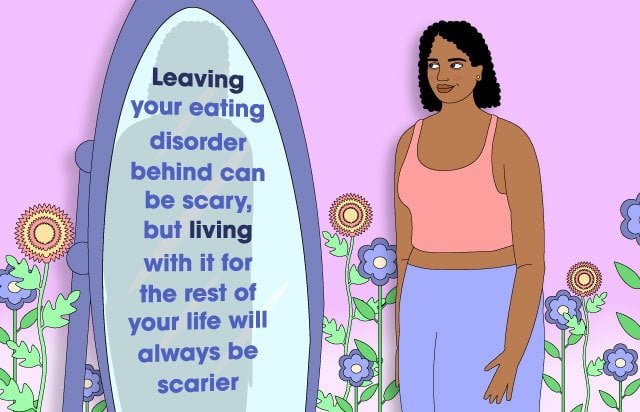Ambassador voices: Recovering from an eating disorder

My name is Rachel Elder. I am an English Literature student at the University of Edinburgh and a Young Ambassador for The Mix, most recently involved in The Body and Soul Club.
Eating disorders are complex mental illnesses that affect people at any weight and any stage of life. They isolate people and try to strip them of their true identity, whilst causing serious physical complications. Eating Disorder Awareness Week is a chance for the millions of people affected by eating disorders to share their stories and raise awareness.
Life with an eating disorder
One thing that makes eating disorders so challenging to live with is the sense of comfort and security derived from them. The illness becomes a safety blanket; a coping mechanism that allows you to deal with or numb unwanted and challenging emotions. With this perspective we can understand why people use disordered eating as a coping strategy.
When I first developed my eating disorder it took months for anyone to convince me that I had a problem, and even after overcoming this first hurdle I came to the next obstacle of figuring out this foreign concept of ‘recovery’. For years I backed out of attempts at recovery, refused treatment, dabbled with ‘quasi’ recovery, all before deciding that I couldn’t face it.
The reality of recovery
The reality had hit me that despite the fact that my eating disorder took so much away from my life, the initial stages of recovery were even more terrifying than the illness itself. Each time I began to nourish my body I would be confronted by a surge of anger, upset and fear – emotions that my eating disorder suppressed.
I spent a long time switching from different sets of disordered eating behaviours in an attempt to recover without really giving up full control, before I finally realised that there was no easy way out. You have to throw yourself into the deep end regardless of how ‘ready’ you might feel.
In those initial days, weeks, or even months of recovery it may feel as though you are drowning amongst the flood of emotions and discomfort you feel. Your body screams at you to get out of the water and go running back to the safety of your disorder. But only in sticking it out, in accepting help and pushing through the extreme initial discomfort can you start to see the possibility of recovery.
Recovery idealism
The glamorised portrayals of recovery that we often see online are incredibly unrealistic. We see snapshots of a person’s life as they jump from one extreme of an illness to a perfect, full and healthy lifestyle within a few photos. Unhelpful ‘before and after’ comparisons portray recovery as an overnight process and limit the definition of recovery to weight restoration alone.
We don’t see the breakdowns over weigh-ins or family meals or that one slice of toast. We don’t see the mental suffering and slow emotional growth. The psychological restoration is just as important as the physical, and the physical restoration is not always just about weight gain.
Taking the leap
Eating disorders are incredibly difficult to deal with, and recovery can often feel impossible, but once you push past those initial stages of fear you start to realise that the possibility of recovery isn’t as far off as it initially seemed. You realise that your eating disorder takes up too much space in your life to allow room for anything else. That there is a possibility of a much brighter future that feels truly worthwhile.
Yes, leaving your eating disorder behind can feel terrifying, but the thought of living with it the rest of your life will always be scarier.
Seeking support for an eating disorder
If you or someone you know is living with an eating disorder, know that you are not alone and we are here for you. If you need to talk then our team of experts and trained volunteers offer free and confidential support.
Read our expert chat with eating disorder charity, Beat.
You can also read our article on how to beat an eating disorder relapse.
Next Steps
- Beat help people overcome eating disorders through helplines, online support and self-help groups. Call 0808 801 0677 or, if you're under 18, call their Youthline on 0808 801 0711.
- The Self-Esteem Team (SET) run workshops in schools across the UK to help tackle young people's issues with body image, self-worth and mental health.
- Mind offers advice and support to people with mental health problems. Their helpline runs nine to six from Monday to Friday. 0300 123 3393
- If you're under 25 and would like free confidential telephone counselling from The Mix to help you figure things out complete this form and we'll call you to arrange your first session.
- Chat about this subject on our Discussion Boards.
By
Updated on 04-Mar-2020
No featured article














